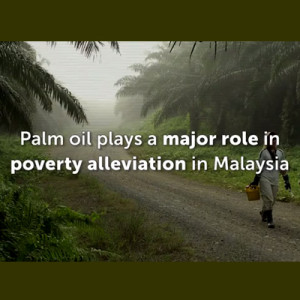MPIC Secretary General, K. Yogeesvaran reminds Europe that while Malaysia is delivering, the EU should too
The second speaker of the day, K. Yogeesvaran, Secretary-General of the Ministry of Plantation Industries and Commodities (MPIC) in Malaysia addressed the conference on the topic of “Recent developments in sustainable palm oil policies and operations in support of SDGs in Malaysia.”
Malaysia walks the talk
The Secretary-General pointed out that the theme for this year’s EPOC, “Taking responsibility in sustainability” to “protect the environment and improve socio-economic conditions” fits the approach taken by Malaysia’s palm oil industry like a glove.
He substantiated Malaysia’s claim to be a good steward of the environment while further developing its national economy by citing the following examples of best practices in the palm oil industry:
- Today, Malaysian palm oil is cultivated on a total of 5.7 million hectares of land. That is equivalent to roughly 17% of the country´s total land area and only 0.4 percent of all land used for agriculture globally;
- As one of the few countries in the world Malaysia maintains over 50% of its land area under natural forest cover, thus over-fulfilling the commitment made at the Rio Earth Summit in 1992;
- Malaysia prides itself for being a helpful voice at the climate change talks in Copenhagen and Paris; as part of the country’s commitment to COP 21, Malaysia agreed to cut its greenhouse gas emissions by 45% – voluntarily. And it is well on track, having reached a reduction of 33% to date;
- In Malaysia, there are more than 60 laws and regulations specifically designed to protect against environmental degradation through palm oil production; those include a zero-burning policy and protection of natural wildlife habitats, like those of the Borneo orangutan plus several high conservation areas (HCAs);
- Malaysia spends considerable resources and makes good progress in developing the Malaysian Sustainable Palm Oil certification scheme (MSPO); the standard will become mandatory for all industry players by the end of 2019 including smallholder farmers. Malaysia thereby hopes to send a signal to the world that its commitment towards certified sustainable palm oil (CSPO) is unwavering;
- the Malaysian government is providing further financial incentives to improve the uptake of the MSPO certification to the tune of US$35 million; furthermore, a comprehensive review of the standards will be undertaken in 2018 to strengthen, streamline and benchmark them in accordance with globally accepted principles.
Against this backdrop of the significant efforts Malaysia undertakes to promote sustainable palm oil Secretary-General Yogeesvaran also pointed to the pivotal role the crop plays in the nation’s socio-economic development.
Still today almost 40% of the total area planted with the oil palm in Malaysia are cultivated by around 650,000 small farmers. The international success of palm oil plus domestic support for instance through the Federal Land Development Authority (FELDA) have dramatically improved rural incomes and infrastructure. Formerly landless farmers now enjoy landownership and higher earnings. The contribution of palm oil in eradicating poverty in Malaysia cannot be overstated.
The EU should work in tandem with Malaysia
Notwithstanding the crucial contributions palm oil makes to the Malaysian economy, nor the remarkable progress made regarding sustainability could dissuade the European Parliament from adopting its Resolution on Palm Oil and Deforestation of Rainforests on April 4th, 2017 by an overwhelming majority. It was followed by a vote of the Environment Committee (ENVI) on October 24th to eliminate palm oil from EU biofuels by 2021.
Mr. Yogeesvaran expressed concern that such initiatives “if adopted as regulations, may impede market access and in the longer term negate economic growth in the palm oil producing countries. Also, they do not reflect the commitment by the global community towards meeting the UN Social Development Goals (SDGs) in terms of eradicating poverty and raising income levels.”
The Secretary-General emphatically asserted Malaysia´s view that such measures are ignorant to the realities found on the ground, to the intricacies of the global palm oil supply chain, and, indeed, of the de facto environmental footprint of palm oil compared to other vegetable oils.
He also insisted that all policy measures regulating an economic sector – be it in the European Union or elsewhere – must comply with the minimum standards of good governance. Those include:
- adhering to existing international treaties like the WTO principles of non-discrimination;
- respecting the United Nations´ Agenda 2030 and the SDGs adopted by 193 countries, including the EU;
- being based on sound scientific evidence;
- prior consultation of all involved stakeholders in the interest of international cooperation.
The Secretary-General stressed that all measures that do not respect the efforts producing countries continue to undertake on the road to sustainability, like the MSPO, but that instead drain resources from the sector will only lead to frustration within the industry and achieve nothing.
Secretary-General Yogeesvaran insisted that Malaysia continues to be unwavering in its support for sustainably produced palm oil. At the same time, the country needs to protect a sector that provides employment (including supporting industries and downstream activities) for close to four million people, or 25% of the Malaysian labor force.
His closing words were: “It is also my sincere hope that the EU will continue to engage palm oil exporting countries in regular dialogues, to better comprehend the issues relating to sustainability and bridging the gap.”










Leave a Reply